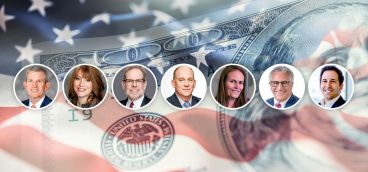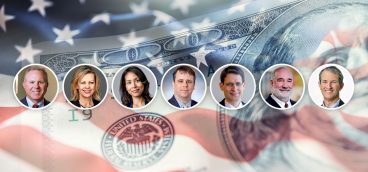Positioning Client Portfolios: Federated Hermes, Northwestern Mutual, Bill Few Associates, Schenley Capital

Each year in the summer issue, we ask a group of Pittsburgh’s leading investment experts to answer a question for our readers in 250 words or less. This year’s question: “The coronavirus has led to the first bear market in more than a decade with widespread uncertainty remaining. How are you positioning your client portfolios in this fraught environment?”
Linda Duessel, Federated Hermes
Bullish with ballast. We remain long bulls on the stock market, especially the United States. We believe we can withstand this crisis because businesses and consumers had record cash flows going into it and because our government and the Fed went truly big with stimulus, which is exactly what they did not do in the Great Depression. We’ve taken out the worst that can happen.
We’re particularly bullish on growth areas such as tech and biotech that boast strong cash flows and profit margins and have been relative winners in both down and up moves. For those with a stronger risk appetite, cyclical sectors tend to outperform coming out of a recession, with beaten-down financials and certain areas of consumer discretionary well positioned once the economy starts to make that turn. On the consumer front, we’re not talking cruise lines or airlines. But clearly, Americans like to shop. That’s what we do. For those who really are risk-seekers, parts of the energy patch, which has been crushed, may offer select opportunities. But use caution and a diversified approach, please!
With all of this, make sure to include ballast—high-quality dividend companies. If 80 percent of the money is held by aging baby boomers, they are going to need reasonably conservative income. And they’re not getting any yield anymore and probably won’t for a long time from Treasury bonds—not with the trillions and trillions of debt our government is racking up to fight this unprecedented situation. Bullish with ballast. n
Kevin Miller, Northwestern Mutual
When clients work with an advisor, they need to build a long-term financial plan. Treat your whole financial picture like a large company that’s built to withstand whatever the future holds.
Investing is just one component of a plan. We believe a comprehensive financial plan also manages risk to make sure you have money for what you need when you need it—no matter the financial market conditions.
A good advisor will stress test your financial plan to make sure it holds up in many situations, including unexpected and unpredictable market downturns. He or she will forecast the impact a disability might have on your plan and include an appropriate amount of disability insurance coverage to manage that risk. It could also include a plan to access cash value life insurance or other stable funds that aren’t affected by the market to generate income during a downturn.
Stress-testing a client’s overall investment allocation in the context of their integrated financial plan ensures that they don’t have to sell stocks during times like these and can ride through the short-term volatility that inherently occurs along the path to long-term success.
With a well-constructed plan that manages your risks, you can feel emboldened to trust the plan and stick with it for the long haul. Stocks, for example, are truly for intermediate- to long-term financial goals. If you have a plan, you shouldn’t need to sell equities during temporary bouts of fear. In fact, a key to market success is to see past these fears and not panic when others do.
Alison F. Wertz, Bill Few Associates
As a financial advisor, the only certainty I can guarantee my clients is that eventually there will be a recession. In almost every meeting with clients, I talk about what a recession might look like and we discuss how it might impact them personally. This helps drive decisions such as how much should be in an emergency fund, what is the appropriate allocation between stocks and bonds, is it wise to buy a second home. I may counsel a 40-year-old client, working in an economically sensitive industry, to keep a larger than average emergency fund. Having more cash set aside will help them protect against the potential loss of income. More typically, I am counseling clients approaching or in retirement. We discuss the importance of maintaining a minimum of seven years of their income need in bond-like investments, so they can be patient when stocks decline in the short term. Essentially, I am positioning my clients’ portfolios in the same way I always have—when the markets are high, we rebalance on the market’s strength. During bearish markets, we embrace the downturn and take advantage of the fire sale, continuing to invest in the same manner as when the markets were expensive. By planning for bearish markets in the good times, I proactively position my clients and their portfolios for times like these.
Beth Genter, Schenley Capital
We have recently witnessed a very sharp and abrupt downturn in the market with accompanying high volatility. To illustrate the latter point, in mid-March, the index for volatility—the VIX—reached +76, which was close to its historic high and far above its typical level of around +20. Fortunately, this period appears to be behind us and we can turn our attention once more to the economy and its recovery. The uncertainty, of course, is whether the monetary and fiscal measures introduced by the Administration will work together to diminish the impact of the virus. Certainly, we believe that the recovery will be U-shaped and slow. The market faces challenges: low oil prices and low-interest rates as well as a stressed banking system. Therefore, to hedge against a downturn, we always focus on diversifying client portfolios and taking the long-term view. In fact, we believe that what we have at present is an excellent opportunity to reposition. We are harvesting losses and are reallocating the proceeds into high-quality equities in sectors that have suffered during this period, as well as into those with low debt, high free cash and high operating margins. In addition, as spreads have widened, we are allocating our fixed income into high yield and structured debt. As the saying goes, where there is great uncertainty, there is always great opportunity; never was this maxim so true today.





